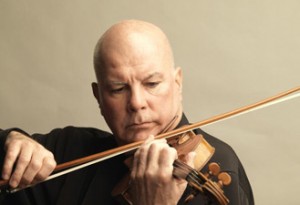
Violinist Oliveira Next Up on Sunday Series
The violinist Elmar Oliveira won the gold medal in the Tchaikovsky competition in 1978 (sharing it with Latvia’s Ilya Grubert), and is still the only American ever to win that prize. Since then he’s been steadily concertizing, recording and teaching.
I’ve heard him a couple of times up at Lynn University in Boca Raton, once in a packed recital for students and faculty welcoming him to the campus, and earlier this season in a big-boned reading of the Mendelssohn concerto that won over a large, enthusiastic audience.
He is a player of commanding force and huge sound, a musician of thorough technique whose work has authority and presence. He’s a devotee of overlooked repertoire, as well: in 2008, he released a disc of the concertos by the Swiss-American Ernest Bloch and the American Benjamin Lees, who died earlier this year. Both works are compelling and dramatic, and it would be good to hear them more regularly on concert programs.
On Sunday, Oliveira comes to Gusman Hall for a recital in the Sunday Afternoons of Music series, which marks its 30th anniversary next year. He’ll be there with pianist Robert Koenig in a program of Handel (the Sonata No. 6 in E), Beethoven (No. 9 in A, Op. 47, Kreutzer), and the Violin Sonata of English composer William Walton. In the fashion of many violin recitalists, and as he did in the Lynn recital I saw, he’ll also play various short works that he’ll announce from the stage.
The Kreutzer sonata in particular is a landmark of the violin literature. Long and powerful, it’s written in Beethoven’s most rewarding middle-period style, with massive contrasts between the movements and a narrative arc that indicates the hand of a master dramatist. One of the key wellsprings of Beethoven’s art was his facility for variation, and the second movement here is a good example of his no-holds-barred approach to building something monumental out of seemingly inconsequential material.
I don’t know the Walton Sonata well, though I do have a recording of it, but Walton deserves more hearings on this side of the pond than he usually gets. I suppose Belshazzar’s Feast is still the piece that’s most often heard in American concerts, and once long ago I heard the Florida Philharmonic do the Spitfire Prelude and Fugue, I think.
Oliveira is doing good service for the repertory by programming the Walton. The canon of works that are regularly played and appreciated tends to be too small (for a number of reasons), which is why it helps to have questing musicians like Oliveira bring them to our attention.
Although you can’t argue with the plain fact that audiences respond most rapturously to things they know, it’s nevertheless also true that audiences have become increasingly game for newer or unfamiliar works. I’m sure this has something to do with technological innovation bringing so many recordings to us at the click of a hyperlink.
Sunday’s concert will also serve to remind local audiences that this celebrated American violinist works in South Florida. He gives a good recital, with plenty of variety, and both times I’ve seen him he’s managed to raise the temperature in the room.
Recent Content
-
Artsarticle ·
-
Artsarticle ·
-
Artsarticle ·
